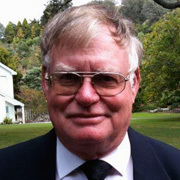
Rod Cornelius
Pahiatua-born Rod Cornelius was always more interested in performing plays than studying. After a short stint as a sales trainee at BP he was handpicked to join professional theatre company The New Zealand Players. In 1960 he stage managed the first national tour of Bruce Mason’s The End of the Golden Weather.
In 1963 his long relationship with television began, when Cornelius became a senior floor manager for the NZ Broadcasting Corporation. After training as a producer he was sent down to Dunedin in 1964 to work as a producer across a wide range of programmes. Shows were rehearsed and transmitted live, with a recorded copy being sent off to other stations. Any recording faults meant starting over and making a new recording. Cornelius soon became an executive producer.
Keen to return to Wellington, he applied for a role there, but an error in his application meant he was sent to Auckland instead. "It was a great time to be there," says Cornelius. "We were doing Happen Inn, which was produced by Kevan Moore, and other productions."
By the mid 1970s, the local TV landscape was shifting. In 1973 Cornelius was part of a small group of executive producers given a bursary to travel overseas, to study two channel TV. Cornelius visited the USA, the UK, Ireland and Sweden.
"In 1974 I was asked to take over the TV station in Christchurch. I had to think about it." Cornelius recalls Auckland television manager Murray Buchanan recommending it as "a good move".
During his three years in Christchurch, Cornelius oversaw the development of the Civic Theatre into a TV studio, and a run of big entertainment shows like That’s Country, plus the blossoming of Christchurch-based talents like David McPhail. By 1977 New Zealand television had undergone a major revamp, with TV One competing against a new second channel, which showcased many local productions.
In 1977 Cornelius headed back to Auckland to oversee the production of documentaries and special interest programmes for South Pacific Television (as the new channel was then called), under the helm of its Director-General Allan Martin.
Prime Minister Robert Muldoon was hostile to this competing channel model and in 1980 the Broadcasting Corporation was remodelled into a complementary two channel set-up. In 1982 Cornelius took a big step up and became Controller of Programme Production for TVNZ, overseeing production details at a time when television was producing the majority of its drama, children's and current affairs content in-house.
In 1986 Director-General Julian Mounter ordered staff cutbacks. The reality of firing people he knew did not sit well with Cornelius. In many cases he offered workshop space and equipment free to those affected, with a proviso they provide services to TVNZ. New businesses involving wardrobe and props were born from this arrangement.
TVNZ productions were gradually contracted out to independents. In 1989 Cornelius shifted roles again and became assistant to Des Monaghan, who purchased and scheduled new productions. In 1994 Cornelius rose up another notch to become Executive Director of Resources for TVNZ, directly responsible to Director-General Julian Mounter. Mounter — an Englishman brought over to shift TVNZ from a state to a business model — shifted management from Wellington to Auckland, and splintered the company into separate entities. Eight Executive Directors were in charge of the various arms, all competing with each other. “Essentially we were charged with getting TVNZ ready for sale,” says Cornelius.
Under Mounter’s reign the company made bold commercial moves, setting up company Clear Communications (forerunner to Vodafone) with Bell Canada. "In addition we owned a third of Sky. Julian’s idea was to protect its sports rights, and we would have been dead in the water if we didn’t have those.”
The National Government of the day changed the course of the company, selling down its shares in Sky and Clear. Says Cornelius: "They didn’t get why a TV company would be interested in telecommunications. This is so obvious now with the convergence of these two technologies. Well after that many of the Executive Directors left the company”.
In 1994 Cornelius became Managing Director at Avalon Studios with one clear brief — get out of the red. Avalon had worn a lot of criticism over the years: accused of being too far from Wellington and after 1980, too far from Auckland. Another big sell-off was looming: in 1997 Avalon’s buildings, studios, facilities and the nearby National Film Unit (now owned by TVNZ) were under consideration for being sold off. However with previously unused studio space being opened up, overseas companies like Cloud 9 (The Tribe) and Australian children's productions began using those spaces. By 1998 Avalon was back in the black.
By now Cornelius was eyeing retirement with relief. In the course of his working life he’d had to "downsize the company twice”. But his time in TV wasn’t quite over. In the early 2000s Cornelius was enticed back as a board member for fledgling channel Māori Television. “I said I’d come on for six months. In the end I stayed six years and really enjoyed its development.”
These days Cornelius lives in Devonport, and volunteers at the local museum. He is among those interviewed in the Devonport episode of Heartland.
Profile written by Gabe McDonnell; published on 25 April 2017
Sources include
Rod Cornelius
Michel Higgins, 'Allan Martin' NZ On Screen website. Loaded 30 May 2016. Accessed 25 April 2017
Tom Hunt and Paul Easton, ‘The Rise and Fall of Avalon' - The Dominion Post, 11 April 2011
Andrea O’Neil, 'Avalon TV studios ‘everything broadcasting shouldn’t be' ' - The Dominon Post, 28 March 2015
Unknown writer, ‘Don’t copy our flawed system, former TVNZ head warns BBC’ - The NZ Herald, 1 March 2014